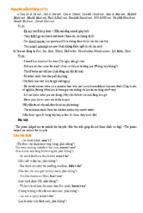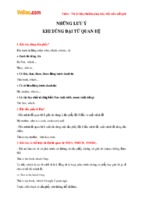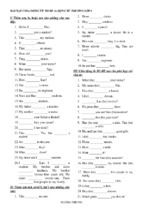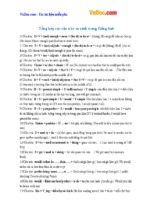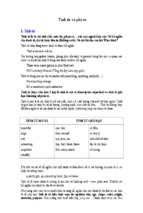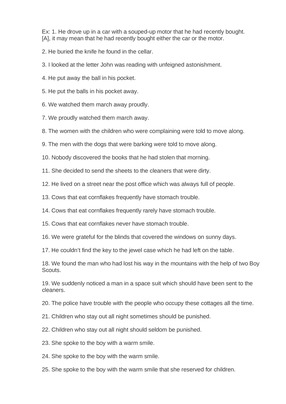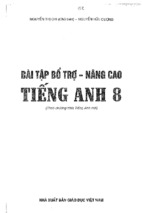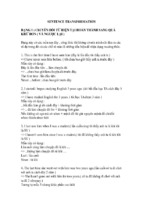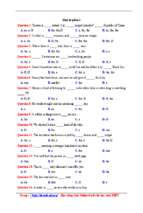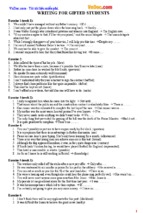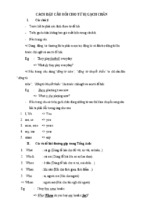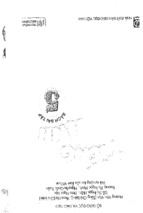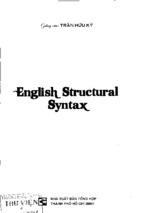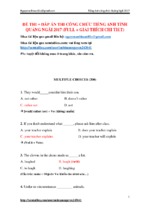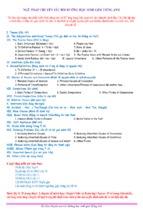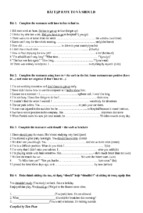Lesson planning
2012
Tieng Anh 11
School year: 2011 -
Consolidatio
n
TENSES
I. Aim:By the end of this lesson, Ss can understand and use some tenses: the simple
present tense, the present continuous tense, the present perfect tense...
II. Presentation:
1. The Simple Present Tense(HTĐ)
a) Form:
- With “normal V”
(+) S + V1/ Vs/es;
(-) S + don’t/ doesn’t;
(?)Do/ does + S+ V1?
Ex: She likes swimming.
Note: Verb is in the present tense (V1)
(If the subject at 3rd person singular, one must add the "s" or "es" after the verb).
- With “ to be”
(+) S + am/ is / are; (-) S+ am, is, are +not; (?) Is/ are +S….
Ex: They are students.
b, Usage: It is used to talk:
- Something is always true; about a permanent situation:
Ex:
+ The sun rises in the East.
+ I am a teacher.
+ Mary comes from England.
- About something that regularly happens:
Ex:
+ She leaves for school at 8 o’clock.
+ I get up early every morning.
+ Mai often goes to school by bike.
Note: Add "es" after the verb ending: O, S,X,CH,SH.( ex: goes,
watches,washes,misses,fixes), ngoại lệ : Piano - Pianos ; Photo - Photos...
Ending "y", remove "y" add "ies" (studies), the exception: Key - Keys ; Monkey –
Monkeys...
c, The adverbs are often used with the simple present tense:
+ Often, usually, frequently : thường
+ Always, constantly: luôn luôn
+ Sometimes, occasionally: thỉnh thoảng
+ Seldom, rarely: ít khi, hiếm khi
1
Lesson planning
2012
Tieng Anh 11
School year: 2011 -
+ Every day/week/month...: mỗi ngày/ tuần /tháng...
2. The Present Continuous Tense(HTTD)
a, Form:
I
He, she, it
We,you, they
+ am
+ is
+ are
+ V-ing
b,Usage:
- Describes actions that are taking place and last for some time now (it is
usually accompanied by the phrase “ now”," right now "," at the moment
"," at present).
Ex: The children are playing football now.
What are you doing at the moment?
- This tense is usually followed by proposals and orders.
Ex: Look! The child is crying.
Be quiet! The baby is sleeping in the next room
- This is also used to describe an action that is going to happen (in the near
future)
Ex: He is coming tomorrow.
My parents are planning trees tomorrow.
Note: Do not use the present continuous tense with verbs that are awareness, perception,
such as: to be, see, hear, understand, know, like, want, glance, feel, think, smell, love,
hate, realize, seem, remember, forget... With these verbs, they are often replaced by a
Simple present tense.
Ex: I am tired now.
He wants to go for a walk at the moment.
Do you understand your lesson?
Yes , I understand it now.
3. The Present Perfect Tense(HTHT)
a, Form:
I, we, they, you
+ have
+ past participle (V3)
He/ she/ it
+ has
( -) S+ Haven’t/hasn’t + V3,... (?) Have/has + S+ V3? )
b, Usage:
- Talk about an action which has just completed
Ex: I have just met my former teacher in the park.
He has finished his homework recently.
- Describe an action to be repeated several times in the past:
Ex: I have seen this film four times.
My mother has read that book several times.
2
Lesson planning
2012
Tieng Anh 11
School year: 2011 -
-
Talk about an action which happened in the past, lasts to the present and
may be continue in the future.
Ex: I have learnt English since 1998.
Peter has lived in this house for five years.
- Describe actions that happened in the past without unknown time:
Ex: I have gone to Hanoi or She has done his homework
c, , The adverbs are often used with The present perfect tense:
+ just, recently, lately: gần đây, vừa mới
+ ever: đã từng
+ never: chưa bao giờ
+ already: rồi
+ yet: chưa
+ since: từ khi( thời điểm)
+ for: khoảng ( thời đoạn)
+ so far= until now= up to now= up to present: cho đến bây giờ
Note: These adverbs are only used with the HTHT in the simple sentence. For sentences
of two clauses or more or in a paragraph, then the verbs must be formed in context.
Ex: She has just seen him.
But : she said that she had just seen him.
I have already done my exercises.
But : when i came, they had already shown the film.
4. The Present Perfect Continuous Tense(HTHTTD)
a, Form:
I, we, you, they
+ have
She, he, it
+ has
+ been + Ving
b, Usage:
- Present perfect continuous to describe an action that started in the past
and extends continuously to the present.
Ex: We have been living in this city since 1989.
How long have you been waiting for him?
I have been studying English for five years.
Note: Do not use the present perfect continuous tense with verbs that are awareness,
perception, then use the present perfect tense.
c, The adverbs are used: since+ mốc thời gian, for+ khoảng thời gian.
Note:
Present perfect tense : The action ended at the present, so the results are remarkably
Ex: I have waited for you for half an hour (now I stop waiting)
Present perfect continuous tense: Action continues at the current ongoing, so no clear
result.
Ex: I have been waiting for you for half an hour.
(and continue waiting hoping that you will come)
5. The Simple Past Tense( QKĐ)
3
Lesson planning
2012
Tieng Anh 11
School year: 2011 -
a, Form:
I, we, you , they
She , he ,it
+ V2(irregular verbs)/V-ed(regular verbs
With “normal V” : (-) S+ didn’t+V1;
(?) Did+ S+ V1?
With “to be”
: (-) S+ was/were+not;
(?) Was/were + S…..?
Ex1: (+) She went to visit her grandmother last summer.
(-) She didn’t go to visit her grandmother last sumer.
(?) Did she go to visit her grandmother last sumer?
Ex2: (+) They were in hospital last month.
(-) They weren’ t in hospital last month.
(?) Were they in hospital last month?
b, Usage: Describe the action happened in the past, stop and know the time.
Ex: He died in 1950.
6. The Past Continuous Tense(QKTD)
a, Form:
I, he, she, it
+ was
You, we,they
+were
+ Ving
b, Usage:
- Describe the action took place and lasted for some time in the past
Ex: I was reading book from 3p.m to 6 p.m yesterday
Yesterday, Mary was working in the laboratory all the afternoon.
- Describe actions that were happening at a time in the past.
Ex: They were learning English at that time
I was doing my homework at 4 p.m last Sunday.
What were you doing at this time yesterday?
- Action was happening (in the past) and had an interjected action (longer
action usingPast continuous tense, shorter action using simple past tense).
Ex: When I came yesterday, he was sleeping
What was he doing when you saw him?
- Two actions occur in parallel at the same time in the past
Ex: Yesterday, I was cooking while my mother was washing the dishes.
Note: Do not use this tense with verbs that are awareness, perception, then use the
simple past)Ex: He felt tired at that time.
7. The Past Perfect Tense(QKHT)
a, Form:
(+) S+ had+ V3(past participle)
(-) S+ hadn’t+ V3
(?) Had + S+ V3?
b, Usage:
- The past perfect tense to express a past action that occurs before a period
in the past or before an act of the past.(If in the two past actions, actions
which happened before, using Past Perfect, and for action after we use
Simple Past).
Ex: We had live in Ha noi before 1987
After I got up this morning, my mother had already left.
4
Lesson planning
2012
Tieng Anh 11
School year: 2011 -
This was the most beautiful flower that I had ever seen.
8. The Past Perfect Continuous Tense(QKHTTD)
a,Form: S+ had+ been+Ving
b, Usage:
- Describe a past action occurred and lasted until the 2nd past act happened
(the second act using Simple past)
Ex: The men had been playing cards for 2 hours before I came.
They had been living in Paris for 10 years when I met them.
9. The Simple Future Tense(TLĐ)
a, Form:
You, He, She,I , We, They
+ will
I, we
+ shall
+ V(bare-infinitive)
(-) S+ will/shall+not( won’t/shan’t) + V(bare-inf)( negative form)
(?) Will/shall + S+ V(bare-inf) ? ( interrogative form)
b, Usage:
- Describes an action that will occur in the future (a determination or an
opinion about a future action)
Ex: I’ll call you tomorrow.
They’ll come back next week.
c, The adverbs are used:
+ Someday: một ngày nào đó
+Tomorrow: ngày mai
+Next week/month...tuần/tháng tới
+ Soon: chẳng bao lâu nữa
10. Near Future(TLG)
a, Form:
I
+ am
She, He, It
+ is
+ going to + V(bare-infi) ( dự định sẽ)
We, they, You + are
b, Usage:
- Used to express an action that will occur in a near future, time will be
expressed in a number of adverbs such as “ in a moment” (lát nữa),
“tomorrow”.
Ex: We are going to have a meeting in a moment.
We are going to get to the airport at 9 am this morning.
Note: Today, especially in speaking, Present progressive is often used instead. Used to
describe a certain event happening, even not the near future.
Ex: Next year we are going to take a TOEFL test for the score that enables us to learn in
the US.
11. The Future Continuous Tense(TLTD)
a, Form: S+ will+ be+ Ving
b, Usage:
5
Lesson planning
2012
Tieng Anh 11
School year: 2011 -
- Describe an action to take place and lasted for a period in the future
Ex: What will you be doing when I come tomorrow?
- Describe an action that is going on at some point in the future.
Ex: He will be doing research at this time tomorrow.
She will be living in this house in May next year.
When you come today, I’ll be working at my desk
12. The Future Perfect Tense(TLHT)
a, Form:
S+ Will+ have+ V3
b, Usage:
- The Future Perfect describes an action to be completed in a given time in
the future.
- It is often used in sentences with phrases indicating the time as "By +
timeline"; "By the time"; "By then".
Ex: I’ll have finished my work by soon
They will have built that house by May next year.
When you come back, I’ll have written this letter.
13. The Future Perfect Continuous Tense (TLHTTD)
a, Form:
S+ Will+ have been+ Ving
b, Usage:
- Describe an action that starts from the past to extend to a given point in
the future
- The adverbs are used:
+ By.....for(+ khoảng thời gian)
+ By then
+ By the time
Ex: By september, We’ll have been living in this house for 10 years.
By May 13th , I’ll have been working for this company for 2 years.
Note : Future Tenses not used in the clauses of time, instead of Simple future, using
Simple present, instead of using future perfect (future perfect continuous) we use the
present perfect (present perfect or Continuous).
III.Exercises:
1.Supply the correct verb forms : the simple present tense or the present continuous
tense:
1. Be quiet! The baby (sleep).
2. We seldom(eat) before 6:30.
3.Look!A man (run) after the train.He (want) to catch it.
4.The sun(set)in the West.
5. It (be) often hot in summer.
6. I ( do) an exercise on the present tenses at this moment and I ( think) that I (know) to
use it now.
7.My mother sometimes (buy) vegetables at this market.
8. It( be) very cold now.
9. It ( rain) much in summer. It ( rain) now.
6
Lesson planning
2012
Tieng Anh 11
School year: 2011 -
10.Mary ( cook) some food in the kitchen at present. She always (cook) in the morning.
2. Supply the correct verb forms: The present perfect or present perfect
continuous.
1. How long you(study)English? For 5 years.
2. I (wait) for two hours, but she (not come) yet.
3. They (live) in Ho Chi Minh city since 1975.
4. She (read) all the books written by Dickens.How many books you (read)?
5. He(not, be) here since Christmas,I wonder where he(live) since then.
6. Peter ( go) to Paris for a holiday, He never( be) there.
7. You ( sleep) so far? I (ring) the bell for the last twenty minutes
8. He(write) a novel for 2 years, but he(not finish) it yet.
9. Mary (lose) her hat and she (look) it until now.
10. I (see) that film several times because I like it.
3. Supply the correct verb forms: Present tenses
1. Listen!I (think) someone(knock) at the door.
2.Up to the present, we(write) almost every lesson in the book.
3. The earth(circle) the sun once every 365 days.
4. The farmers(work) in the field at the moment
5. How many times you(see) him since he went to Paris?
6.Rivers usually(flow) to the sea.
7.Look!The boy (cry).
8.Do you know that man, who(smoke) there?
9.Mrs Green always(go) to work by bus.
10.We (be) from French.We (be) there for 20 years.
11.That house(belong) to Mr Green.
12.Mai (lose) her bike.
13.I(be)sorry. I(forget) that girl’s name already.
14. I (wait) for the manager for 2 hours.
15.You (ever, see) a lion?
4. Supply the correct verb forms: Past tenses
1. Yesterday John(go) to the store before he(go) home
2.Our teacher (tell) us yesterday that he (visit) England in 1970.
3.When John and I got to the theatre, the movie(start) already.
4.Before Alice (go) to sleep, she(call) her family.
5.When the phone (ring), I( have) dinner.
6.Susan(agree) with other members in the last meeting,
7.What you(do) at 6P.m yesterday?
8.The little girl asked what (happen) to her ice-cream.
9.He( teach) in this school before he(leave) for England.
10.She (win) the gold medal in 1986.
5. Give the right forms of the verbs in brackets : future tenses
1. I’m sure they ( complete) the new road by June.
7
Lesson planning
2012
Tieng Anh 11
School year: 2011 -
2. He (wait) for you when you (get) back tomorrow.
3. At this same time tomorrow, we (drink) through Pennsylvania.
4. We (see) you next Monday.
5. In two years from now, the contract (come) to an end.
6. Who (look) after the children when you are away?
7. By novembre I (work) for this company for 6 years.
8. If you call her at 6, she (practise) the piano then.
9. By March 15, I (be) here for one year.
10. We (move) to our new house at Christmas this year.
6. Supply the correct verb forms:
1. I (see) a car accident while I (wait) for you on this comer yesterday.
2. Mr Jone (be) principal of our school since last year.
3. Mr Smith (teach) at this school since he (graduate)in 1980.
4. My father (not watch) TV every night.
5. I (meet) Arthur 3 weeks ago.
6. Yesterday the police (report) that they (capture) the thief.
7. My friend (thank) me for what I had done for him.
8. Someone (steal) my handbag on the bus.
9. The Browns (live) in Paris for 7 years when the second World War (break) out.
10. Last month I (be) in the hospital for ten days.
Answers:
1.
1. is sleeping
2. eat
3. is running – wants
4. sets
5. is
6. Am doing – think – know.
7. buys
8. is
9. rains – is raining
10. Is cooking – cooks
2.
1. have you been studying / have you studied.
3. have been living.
5. hasn’t been – has been living.
7. Have you been sleeping – have been ringing.
9. has lost – has been looking
3.
1. think – is knocking.
3. circles.
5. have you seen.
7. is crying.
9. goes.
11. belongs.
13. am – have forgotten.
2. have been waiting – hasn’t come.
4. has read – have you read.
6. has gone – has never been.
8. has been writing – hasn’t finished.
10. have seen.
2. have whiten / have been writing.
4. are working.
6. flow.
8. is smoking.
10. are – have been.
12. has lost.
14. have been waiting / have waited.
8
Lesson planning
2012
Tieng Anh 11
School year: 2011 -
15. Have you ever seen.
4.
1. had gone – went.
3. had already started
5. rang- was having
7. were you doing
9. had taught- left
2. told – visited.
4. Went- had called
6.agreed
8. Had happened
10.won
5.
1. will have completed
3.will be driving
5.will have come
7.will have been working
9.will have been
2. Will be waiting
4. Will see
6.will look
8.will be practicing
10.will move
6.
1. saw-was waiting
3.has taught-graduated
5.met
7.thanked
9.has been living-broken
2.has been
4.doesn’t watch
6.reported-had captured
8.has stolen
10.was
9
- Xem thêm -

